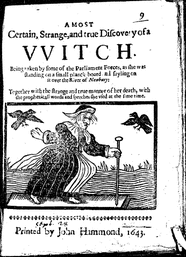 Even though "Halloween" wasn't celebrated in early modern England, witches of course could be found. You only had to seek out the saddest, most down-trodden, marginalized woman in the community, and voila! you'd find your witch. All the better if she were sickly in body or mind, and had no one to protect her. And you could have turned her over to the authorities, and see if she could prove her innocence. (Will she sink or float when tossed in water? Remember, the godly will sink! Does she have Devil's marks--extra nipples--or odd shaped birthmarks? Could she recite the Lord's Prayer without stumbling?) 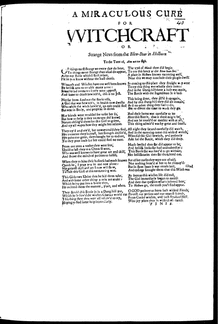 1670 Tract Supplement / A8:1[40] OR... you could have just taken matters into your own hands, and rid the afflicted of the curse. By thwarting the witch, she'll lose her power and die. So if you--or any of your friends--had become cursed, here is what you would have needed to do: Get a bottle of urine from the accursed. Bury the bottle in a dung-hill. Keep careful watch. The witch will be drawn to the dung-hill and will demand the bottle. No matter how she pleads and curses, you can not give her the bottle. Eventually she will die, thus breaking the curse. So simple to get rid of a witch, right? Sure. But of course, the trials weren't about stopping her powers, at least not the supernatural kind. They were about asserting moral and patriarchal authority, and no amount of urine buried in dung would bring about the same ends. Just something to consider this Halloween!
2 Comments
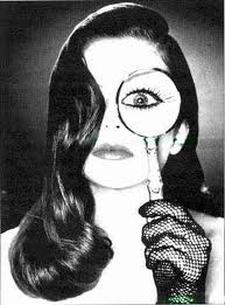 She probably writes reports... Every time my sleuths engage in detective work, I have to laugh a little. After all, as a non-detective I: *am a bit afraid of guns * am not exactly fluent in any language besides English and Kid *can't kick-box *would run screaming if I encountered a dead body *never ever would decide to track down a killer on my own or even with my favorite cop That doesn't mean, of course, I haven't always wondered what kind of spy I'd be.
So I took the CIA personality Quiz. Turns out I'd be the non-glamorous, behind-the-scenes kind. (Hey, we need those too. Right? Right?). Take the test for yourself. Then come back and let me know how you did. Maybe we could form our own elite group of super spies. Apparently, I'll be the one taking notes. 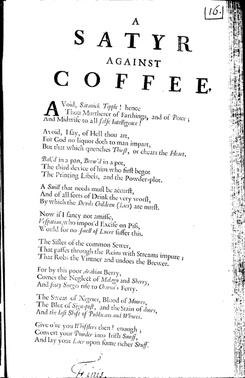 Early hater of coffee. 1674 Wing / 1156:21 As I slip back into my extended coffee break, I will leave you with one more thought about coffee. So as you can probably see by now, coffee was a much disputed drink in the seventeenth-century. Some people championed the drink for its virtues, others for it's "miracles" ("made the corn fall from her lip like a clean acorn!!!"), but many people detested the stuff. Others like "Satyr" the winelover (and how's THAT for a pseudonym?!) were pretty irritated that people were spending their shillings on coffee, instead of England's real mother's milk--ale and wine. To Satyr, drinking coffee was a treasonous act akin to trying to blow up Parliament. But coffee drinkers weren't just traitors, they were godless too. Drinking coffee was pretty much like signing a pact with the devil. According to the "Satyr"... Coffee is "a swill that needs must be accursed, and of all sorts of drink the very worst, by which the devil's children's are nursed." I don't know about you, but I'm ready for another cup. Be back soon! A glimpse into a crime writer's mind--an interview with Greg Bardsley, Author of Cash Out10/19/2012 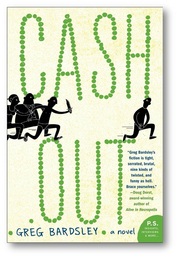 I'm taking a quick break from my blog hiatus to do an interview with up-and-coming crime fiction writer, Greg Bardsley, author of Cash Out (just released by Harper Perennial). Greg and I not only share an agent, the indomitable David Hale Smith, but also the bond of seeing our novels released more or less around the same time. (My book won't be out 'til April 2013, but who's counting?). From the official publicity blurb: Cash Out "is nonstop, mercilessly hilarious, no-holds-barred fiction for fans of The Hangover and Office Space—an outrageous tall tale that follows one desperate, disgruntled Silicon Valley exec through a surreal three-day scramble to cash out his stock options and leave behind his hated high-tech job before outrageous villains (and even crazier friends) completely destroy him." – Harper Perennial ********************************************************************************** What inspired "Cash Out?" You know, as cuckoo as some elements of the book are, Cash Out was inspired by some heavier themes. It started when I began to think back on what it was like to live here on the San Francisco peninsula in the late 1990s. It was such a remarkable time. The Internet was exploding, billions of dollars were amassing, and irrational exuberance reigned. The Peninsula was ground zero for this explosion. The word, after all, was out: This was where one came to quickly acquire unimaginable wealth, extreme luxury, insane property fortunes and a bit of business immortality. This was where 25-year-olds retired. This is where Elton John performed at your corporate Christmas party, and where marching bands arrived at your doorstep to deliver job offers, where college grads with no experience started off at $100,000. Where power and money, always aphrodisiacs, now were supercharged by a prevailing sense of entitlement, forming a powerful new cocktail of narcissistic indulgence. What kind of people did this world this attract? Read Cash Out for my take. Regardless, the end result was that these folks pushed out longtime Bay Area residents, drove home prices into the stratosphere and forever affected the region, its pre-existing culture, its pristine landscape and even its inherent values of inclusion and tolerance. Artists' lofts were transformed into business-incubation offices, hippies were replaced by 6-foot-4 money guys with cell phones pressed against their cheeks, coastal townies are were laughed at and dismissed, longtime residents were pushed into the boonies and the remaining native Californians on the peninsula struggled to maintain not only their sense of self and place, but also their values. This place had changed. So I was thinking about of all of this when I met a former WD-40 public relations guy who had become one of the first one hundred employees at Google. And I found myself wondering, What would I do if I were in his shoes and could cash out? From there, I came up with an idea for a guy who’d be just three days away from cashing out when, suddenly, all hell breaks loose and everything he values in life is at risk. "Cash Out" is set in 2008--is that when you started to write it? How long did it take you to complete the novel? I actually set it in 1999, but we changed the date after Cal Morgan at Harper Perennial bought the book and came up with some good reasons to advance the date to 2008. He felt the story could be more accessible for readers, considering the economic crisis that ensued that year. And he was dead-on. I began to write Cash Out in late 2008, but really started to accelerate my work a year later. It’s hard to know how long it took to write, but my guess is it took about two years. I wrote late at night, after my wife and kids had fallen asleep. Some days I wrote at lunch, or when the family was out for an hour. Some nights I couldn’t stop, and I’d write into the very early morning. I guess you could say the first draft of Cash Out was written during a thousand stolen moments over the course of a few years. You've got some pretty zany characters and circumstances in this novel. How much, if any, of your book is autobiographical? In writing the book, I decided to stick with what I knew best. So in some ways, I gave my protagonist, Dan Jordan, some of my own traits and circumstances. Like me, Dan would be a speechwriter in Silicon Valley working with an array of really smart and interesting people. Like me, he’d feel tired and overworked and worried about losing himself in frothy white waters of the Valley. Like me, he’d have a wife and two boys he’d love with all his heart. And like me, he’d reexamine some of the big decisions he’d made over the years. Unlike me, he’d be days away from cashing out a fortune. People always ask me, who inspired these other characters in the book? So let me clear up a few things and come clean about some others. ... Yes, the book does include a scene where an obnoxious fatty “upper decks” into the water basin of a toilet. But, no, I have never been on the receiving (or giving) end of one of those. ... Yes, the book does feature a man who slathers himself in cocoa butter and throws buck knives at his garage door. But no, he was not inspired by anyone in the peninsula. ... No, I have never been three days from being able to cash out. And no, I have never seen a man eat a rat on a stick in the break room. (Greg, your life is so sheltered --SC) 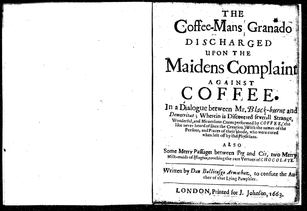 So once again, I need to take an extended coffee break to get started on a new novel. In the meantime, I'll leave you with a description of several miracles attributed to coffee, taken from a 1663 dialogue between "Mr. Blackburnt" and "Democritus." I've discussed the virtues of coffee before, but this time I'll focus on the miracles. In this tract, the two men share "several strange, wonderful and miraculous cures (the like never heard of since the creation!)" brought about by drinking coffee. So after drinking coffee: Helsen, a leather-maker in Dalatia, with a consumption in his eye, became so cured that his "pocket was as bare as a bird's arse." (hmmm...a penny to anyone who can explain what that means!) Calego in Spantego, having been troubled with dimness of sight, "broke his fast with a mess of milk-pottage, and the white of his eyes dropped into the dish" (um, gross?) Anna Marina of Rotterdam saw the corn on her lip, which had long been bothering her, drop from her face like a "clean acorn." (Who needs dermatologists when you have coffee!!!) This just goes to show, when I return from my hiatus and much coffee, I'll be seeing better than ever, with no unsightly blemishes! In the meantime, enjoy your coffee!!! 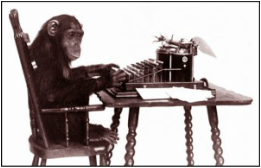 Maybe the trick is to think like a monkey? So I'm thinking about starting a new novel, since I'm still in the revision phase of From the Charred Remains. Even though I'm super excited to start book 3 in my Lucy Campion series, it could be problematic to do so. Especially if my beta readers or my editors tell me I need to rewrite the ending of book 2. That hasn't happened, but who knows? So here are the questions I'm pondering as I procrastinate, er, reflect on this new novel. Most are questions I wished I had asked myself--but of course, didn't--when I began my other novels. There's a bit of choose-your-own adventure quality to this novel-writing business, I find. 1. Do I have an idea that can be developed over 85,000 words? Do I want to spend years with this idea, draft after draft? If yes, I'll continue. If I don't, then I'll stop now. If its not compelling enough to me, than why bother? 2. Where am I going to set this story? Since I like to set my stories in the past, I've been spending some time mulling over backdrop and scenery. While I expect to research details, I find it easier to frame my novel during a time period for which I already have a basic understanding of larger political, social, economic and gender developments and trends. Paging through history texts help me envision specific aspects of the setting. However, I do of course need to find ways to make the "real" world my own. 3. Do I have a point-of-view character? Is this a character I enjoy writing about? Have I thought about what motivates, scares, excites, infuriates this character? Where does this character fit--or not fit--into society? Do I have a sense of her voice? Do I have the image of this character in my mind? Only after I get a semblance of the main character do I feel I can move on. (Here's where I cheat. I usually find a celebrity who looks something like the character I have in my mind; this helps me remember what I think this person is supposed to look like). 4. Do I have a main problem at the heart of my story? If it's a mystery, that's easy. Whodunnit? But I'm writing a different kind of story this time, so I need to think through the central problem. Until I've worked out why this is even a problem, I find I can't proceed effectively. 5. Do I have a general sense of what the other characters want in life? What kinds of quests, problems, motivations do they possess? Are the goals of my minor characters aligned with--or at odds with--those of my point-of-view character? I do figure this out along the way but I find it helpful to have some starting ideas. 6. Do I have a sense of the ending, and perhaps more importantly, a sense of the middle? I think most writers--and perhaps most readers--would agree sagging middles can really ruin a novel. So I like to think through the middle a bit before I start floundering. I've been in that morass before, and I don't like it. Jump in with a line to the other end, is how I like to think about it! (Yet, I've messed this up twice. Note to self: IN MYSTERIES, FIGURE OUT WHO THE KILLER IS BEFORE STARTING WRITING!). 7. And one last question...How will I ever string together another 85,000 words in a meaningful way? (There's a related question here: Why am I doing this crazy thing?) While I've thought about hiring 1000 monkeys to type for a 1000 years, I'm going to try the best approach I know: After figuring out the shape of my story, I will just take one scene at a time. If necessary, one paragraph at a time. And if really necessary, I will just-peck-one-word-at-a-time-until-the-first-draft-is-done. And that's it! What about you? What questions would you (do you) ask, when you sit down to create a new novel from scratch? And how many bananas will you need to feed the monkeys? 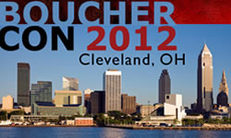 At last! Bouchercon 2012!!! Tomorrow I'm heading off to the world mystery convention, where readers, authors, librarians, agents, and publishers get together and talk mysteries and crime fiction. A year ago, I hadn't even heard of this amazing convention. More over, when I had arrived as a wide-eyed new author, I quickly discovered I wasn't even pronouncing the name properly. Named for famed mystery critic Anthony Boucher, apparently the conference is pronounced Bough- cher-con, not Bowchercon, and certainly not Boochercon like I thought. Or maybe it's the other way around. Oh well. I'll find out tomorrow. Since A Murder at Rosamund's Gate is not out yet (Don't forget, April 23, 2013!), I won't be doing any book signings or anything like that. Given that I haven't worked out a fun way to sign my books yet (6 1/2 months to figure that out!), that's probably a good thing. However, this year, I do have a teeny space in the program. I will be part of a "New Authors Coffee" on Friday morning-- I get to stand up for two minutes, with a slew of other new mystery authors, and share something about my book. What exactly I'm going to say, I have no clue (which, you know, seems to be a bad thing to admit to other mystery writers. :-) ) Two minutes. A commercial break. An amusement park ride. A descent in an elevator. A walk down an aisle. Not a lot of time, some might think. Certainly, that's true. I've asked myself, how can I capture ten years of work, three hundred some pages, an entire cast of characters, plot and subplots etc in just 2 minutes? It's daunting, overwhelming...and wonderful. A huge, strange moment. My first public moment as an "author." (Here's hoping I don't blurt out nonsense! Or babble on about the concept of two minutes! Or muse about my pronunciation issues. Most importantly, let's hope I focus on my book!) Two minutes. Everything changes! |
Susanna CalkinsHistorian. Mystery writer. Researcher. Teacher. Occasional blogger. Categories
All
Archives
May 2023
|
 RSS Feed
RSS Feed